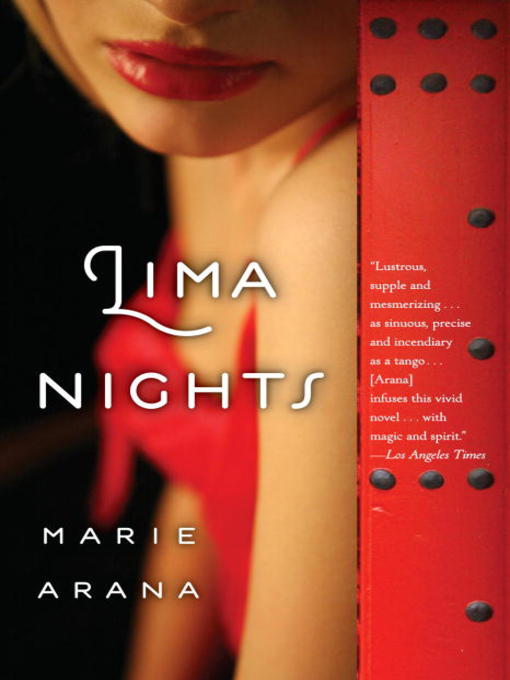
Lima Nights
A Novel
- اطلاعات
- نقد و بررسی
- دیدگاه کاربران
نقد و بررسی

October 20, 2008
Set in Peru's capital city, this spare, unsentimental novel examines the far-reaching and life-changing consequences of sexual obsession. Carlos Bluhm, a married father of two, is enjoying an outing at a sleazy club in 1986 when he meets 15-year-old Juana Maria Fernandez, a dancer working two jobs and living in the slums. Maria is the polar opposite of Carlos's Germanic wife, Sophie, and he is immediately captivated by her. After Carlos takes Maria away for an illicit vacation, Sophie discovers her husband's affair and moves her sons, her mother-in-law and all of the house's possessions while Bluhm is on vacation with his mistress, leaving Bluhm to come home to an empty house. The second half of the book flashes forward 20 years, revealing Carlos and Maria uneasily living together and beginning to drift apart. Trying to preserve the lifestyle she's come to depend upon, Maria makes desperate attempts to keep Carlos under her spell. While the story ends with a whimper, the finely tuned human drama and subversion of the happily-ever-after drive home the setup's inherent sadness.

October 15, 2008
A culturally sensitive, quite grown-up story of love across class and ethnic lines in South America, where such things do not go unnoticed.
Arana moves from the Peruvian rainforest, the setting of her novel Cellophane (2006), to the nation 's capital —more specifically, to the neighborhoods ringed by tall wrought-iron fences and concrete walls with which the elite keep out the poor. One such hermetic estate is the home of the Bluhm family, German in their hearts though "raised entirely in Spanish, on Creole food, in the heart of the Inca continent. " Bluhm p 're isn 't rich, and there are tuition fees to pay to keep his children at the best schools, but he 's well enough off that, when opportunity knocks, he 's prepared to accept the class burden of setting up a casa chica (love nest), a mistress and possibly a second family on the side. Enter Maria Fernandez, an underage dancer in a tango bar, a chola (half-breed), dark-skinned and, naturally, a temptress. He hunts her; she hunts him. Bluhm falls, of course, though a friend warns him, "Don 't mess with children. " Maria notes their many differences, including this: "You live in San Isidro and have ancestors you 'd like to write about. I live in Lurigancho —I have no idea where my ancestors are from. " No matter. Love ensues, and with it disaster that unfolds over a narrative covering more than two decades, during which the members of Bluhm 's circle become no more inclined than before to embrace indigenes. (One had considered inviting Maria to a fundraiser for the homeless, but "the more she thought about it, the less she could recall seeing dark-skinned people at any of those affairs, except, of course, as staff. ") Suffice it to say that things do not end well, and for complex reasons that Arana, herself Peruvian, explores with psychological awareness and sympathy.
Brooding and elegant, much against the grain of lighthearted South American love stories like Mario Vargas Llosa 's Aunt Julia and the Scriptwriter.
(COPYRIGHT (2008) KIRKUS REVIEWS/NIELSEN BUSINESS MEDIA, INC. ALL RIGHTS RESERVED.)

November 15, 2008
Camera salesman Carlos Bluhm lives amid the trappings of the fading German émigré aristocracy in Peru with wife Sophie and two teenage sons. We first meet him in 1980s Lima, prowling the dance halls with friends on a drunken boys' night out. Later, middle-aged and paunchy, Carlos manages to catch the eye of Maria, a pretty 16-year-old bar girl from the city slums. What begins as a passionate affair, assumed by most to be a passing fancy, destroys the Bluhms' staid marriage and moves Maria full force into Carlos's life and home. Twenty years later, we find Carlos and Maria just barely together, as years of inequity, misunderstanding, and suspicion have grown impossible to ignore or forgive. Acclaimed Peruvian American author Arana ("Cellophane; American Chica") takes an unflinching look at a troubled relationship in this compelling work full of the unspoken thoughts that can change fate and the unexpressed feelings that widen the distances between us. A terse, almost stark departure from the lyrical "Cellophane", this intelligent novel should bring new readers to Arana's work. Highly recommended for all academic and public library fiction collections. [See Prepub Alert, "LJ" 9/1/08.]Jenn B. Stidham, Houston Community Coll.-Northeast, TX
Copyright 2008 Library Journal, LLC Used with permission.

Starred review from December 1, 2008
Arana follows the panoramic Cellophane (2006) with a concentrated tale of love, prejudice, and terror. Lima is in the grip of the Shining Path nightmare in 1986, when Carlos and Maria meet in a dance club. A teenage beauty working two jobs to support her ailing mother and brothers, Maria lures Carlos, of German descent and middle-class complacency, onto the dance floor for a tango lesson, the first session in an ultimately harrowing course in suffering. Ensconced in his grandfathers spacious, fancy house, Carlos is adored by his good mother, upright wife, and two fine sons. He isnt making much money and should not be out carousing, although he insists to himself that he has no intention of getting entangled in a serious affair. But wildly aliveMaria enchants him, while she hopesthat her golden lover will rescue her from slum life. Writing withintensity and precision, Arana forges an unrelenting drama of lust and betrayal profoundly complicated by racism and fear, magic and spirituality. An erotic, catastrophic love story that grows more mysterious by the page, Aranas novel of taboo passion, tragic misperception, and lifes hidden dimensions is as shattering as it is seductive.(Reprinted with permission of Booklist, copyright 2008, American Library Association.)




دیدگاه کاربران